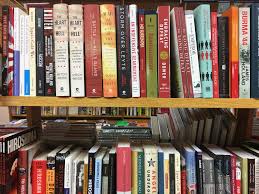
Happy Birthday to me!
Today is my birthday.
I’m 65.
This is a milestone year which is defined as “an action or event marking a significant change or stage in development.”
That got me thinking about other such times in my life, like 18. That was a big one, signaling, as it did, fleeing the nest, heading off to college, where I would be on my own. At least, I thought that was the case. Considering my parents footed that financial bill, my belief in my own independence was perhaps mistaken. Still, it was a newfound freedom.
Twenty-one was memorable, if only that I could imbibe without a fake ID.
At 24, I refereed my first game: a youth ice hockey contest, where tiny players leaned on sawed-off sticks, jerseys dipping below their knees, helmets tilting rakishly. That game led to a 40-year officiating career, where I called amateur football, baseball, ice hockey, soccer, and basketball games, all initially in an attempt to prepare for a life in sports reporting.

Look closely, children. This is an artifact from another time. It’s called a typewriter.
At 28, I finally got that coveted first sportscasting job, a profession that thrust me into the wacky world of the newsroom, where – and you’ll know I’m old here – reporters smoked incessantly and banged away on heavy, black typewriters, the clackity-clack of keys keeping a manic beat as we chased the news.
I married at 33.

After working for five TV stations, my sportscasting career came to an end.
At 41, my sportscasting career ended, a casualty of my age. You see, in sports, 18-to-34- year-old males are the target audience. The thinking went – and pretty much still does – that after that age one is not pretty enough to sit in front of a camera. I mourned my lost career as a death and will admit here that it took a while for me to regroup and move on.
When I was 44, I applied for a sports-writing job with a small local newspaper, and though the editor was dubious about my abilities, he gave me a chance. It was during that seven-dollar-an-hour, minimum-wage job that I discovered I was pretty good at writing. I know because my editor kept saying “You’re on the front page again!”
I was 45 when I entered a classroom, a newly-minted teacher in a Title I high school in Phoenix, where I was tasked with teaching journalism, communications skills, and reading to children living in poverty, students who dealt with all the problems that status serves up. I thought the job would be easy. I was humbled in a week.
That same year, I divorced.
Four years later, I self-published my first book, the beginning of my life as an author. Since then I’ve written four more novels, an adventure that, so far, includes an agent and five different publishers.

I’ve been diving regularly for 15 years.
When I was 50, I celebrated with a trip to Australia where I hunted for minerals with Aussie miners, slept under a night sky in the outback, and jumped into the sea above the Great Barrier Reef. Since then, scuba diving has taken me around the globe, an ongoing adventure of such beauty I can hardly find the words to describe it. Swimming with sea beasts large and small has become my passion.

Thanks to the foster care system, I became a mother at 55. And though my boys are now all in their twenties they still call me Mom.
At 55, a phone call made me a mom. A former student landed in foster care, a frightening journey that ended with me. Today, I have three sons, all of whom spent time in the system, and despite being in their twenties they still call me Mom. I hope they always will.
That same year, I finally picked up that guitar I’d been toting around for 35 years, so music – which had been one of my greatest loves – was back in my life, hopefully never to abandon me again.

I’ll admit, I cried after refereeing my last football game.
Now, ten years later, everything is changing again. I called my last football game in November. I hung up my white hat and whistle, because a lifetime of injuries now prevents me from successfully dodging players rushing my way. And, at the end of this school year, I will leave my classroom for the final time. Twenty years of teaching over.
Looking back, I realize I have been so very fortunate. I wouldn’t change a thing, though I wish I had better teeth and that I had taken those piano lessons more seriously.
I am excited about the future and what comes next. My sweetie pie and I have plans that include a nightly light show over the Caribbean and a peaceful St. Croix hillside with fruit trees and a garden, as well as a few cats and dogs. I know I will write more books – simply because I love to – and I will swim with sea creatures whenever I can. I will hunt for rocks, learn to play my new piano, spend time with the boys, and be prepared for any adventures that come my way.
Today is my birthday.
I’m 65.
A woman flees an abusive husband
and finds hope in the wilds of the Arizona desert.
Rebecca Quinn escapes her controlling husband and, with nowhere else to go, hops the red-eye to Arizona. There, Gaby Strand – her aunt’s college roommate – gives her shelter at the Salt River Inn, a 1930’s guesthouse located in the wildly beautiful Tonto National Forest.
Becca struggles with post-traumatic stress, but is enthralled by the splendor and fragility of the Sonoran Desert. The once aspiring artist meets Noah Tanner, a cattle rancher and beekeeper, Oscar Billingsley, a retired psychiatrist and avid birder, and a blacksmith named Walt. Thanks to her new friends and a small band of wild horses, Becca adjusts to life in the desert and rekindles her love of art.
Then, Becca’s husband tracks her down, forcing her to summon all her strength. But can she finally stop running away?
Kindle Pre-orders available at:
https://www.amazon.com/dp/B085ZX1WCZ?tag=creati0a5-20
Paperback Pre-orders will be available soon.












